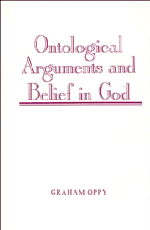Book contents
- Frontmatter
- Contents
- Preface
- Acknowledgments
- Ontological arguments and belief in God
- Introduction
- 1 Some historical considerations
- 2 Definitional arguments
- 3 Conceptual arguments
- 4 Modal arguments
- 5 Meinongian arguments
- 6 Experiential arguments
- 7 “Hegelian” arguments
- 8 Application to historical arguments
- 9 Are there (other) global objections to ontological arguments?
- 10 Is existence a predicate?
- 11 The uses of parody
- 12 Are ontological arguments of any use to theists and/or atheists?
- Conclusion
- Literature notes
- Bibliography
- Index
Introduction
Published online by Cambridge University Press: 05 May 2010
- Frontmatter
- Contents
- Preface
- Acknowledgments
- Ontological arguments and belief in God
- Introduction
- 1 Some historical considerations
- 2 Definitional arguments
- 3 Conceptual arguments
- 4 Modal arguments
- 5 Meinongian arguments
- 6 Experiential arguments
- 7 “Hegelian” arguments
- 8 Application to historical arguments
- 9 Are there (other) global objections to ontological arguments?
- 10 Is existence a predicate?
- 11 The uses of parody
- 12 Are ontological arguments of any use to theists and/or atheists?
- Conclusion
- Literature notes
- Bibliography
- Index
Summary
The following is a discussion of certain kinds of arguments for the existence of God. The distinctive feature of the arguments - at least according to the traditional Kantian method of classification - is that they proceed from premises which at least some defenders of the arguments allege can all be known a priori. Consequently, it would be most appropriate to call these arguments ‘a priori arguments for the existence of God”. However, following Kant, it has been established practice to call these kinds of arguments “ontological arguments,” and I see no urgent reason to depart from this tradition. Many things have well-established but inappropriate names - for example, the Holy Roman Empire, which, as Voltaire pointed out, was neither holy, nor Roman, nor an empire.
I shall divide the arguments that I consider into six classes, namely, (i) definitional arguments, whose premises invoke certain kinds of definitions; (ii) conceptual arguments, whose premises advert to the possession of certain kinds of concepts or ideas; (iii) modal arguments, whose premises advert to certain possibilities; (iv) Meinongian arguments, whose premises invoke a distinction between different categories of existence; (v) experiential arguments,whose premises include the assumption that the concept of God is only available to those who have had veridical experiences of God; and (vi) “Hegelian” arguments, which, at least in my view, bear some relation to the philosophy of Hegel.
Information
- Type
- Chapter
- Information
- Ontological Arguments and Belief in God , pp. 1 - 3Publisher: Cambridge University PressPrint publication year: 1996
